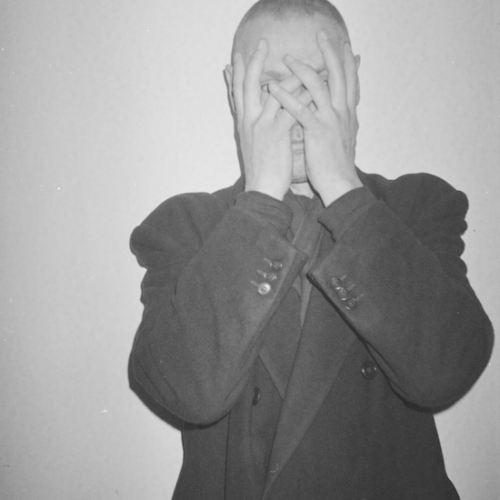Photo by Simon Milner
To receive our Spring Equinox release Birds Catching Fire in The Sky by UKAEA become a Quietus Sound + Vision subscriber
"I’ve done plenty of 70 hour weeks in the last few years, and I can tell you, I’ve had enough of it. I’m ready for something else," UKAEA’s Dan Jones says, laughing.
It’s 10am on Saint Patrick’s Day here in the American Midwest. Local rivers and watered-down beers have been dyed green in preparation for terrifying shitfaced revelry. In the UK, Jones is steeling himself for what’s sure to be a brutal bar shift. We’re talking about his bracing new record under the name UKAEA commissioned exclusively for The Quietus Sound + Vision subscribers, Birds Catching Fire In The Sky. tQ’s Spring Equinox release, it has a rejuvenating quality like a fire through a pine grove. Or, perhaps, like an upturned cop car. Our conversation, you see, has drifted toward the general State Of Things: conservative wreckage, the exploitation of labour, and the current upheaval in France as workers respond to those issues.
"The idea that if they dismantled the UK’s public safety net, we’d be burning police cars and stuff like that – maybe that was true, decades ago, but I feel like we’re such a meek country these days," he says. "People are cowed, taking the bit between their teeth willingly.
"Birds Catching Fire In The Sky has come primarily from quite a grim time in my life," Jones continues. "In 2020, with the start of the pandemic, I was reeling off adrenaline and going, ‘Wow, maybe this is the collapse of capitalism.’ It was a horrible time, but there was a latent excitement in not knowing what was going to happen. 2021 was where the drudgery kicked in, and everything was still basically unchanged, but it became apparent that the power structures that controlled things before the pandemic were going to persist after it. I experienced a huge loss of morale, and just set about making some pretty bleak, angry music."
Like its predecessor, Energy Is Forever, Birds Catching Fire In The Sky is a noisy, heavily percussive, collaborative affair, enlisting six lyricist-vocalists and another six studio players in addition to Jones. But unlike its predecessor, which occasionally reached for the disassociated bliss of the rave, it never seeks to transcend the material reality of our world. Instead, "this one is slamming the present pretty hard in your face as we ratchet up the insane acceleration of everything on Earth," says Jones. The title clues us in to the overall vibe.
"I woke up with that phrase in my mind after a really fucking terrible dream and it stuck," Jones says. "I punched it into Google, and it does happen. They’ve got some parabolic mirror for a solar power plant somewhere – birds did catch fire in the sky there. I thought there was just a general sense of desperation and apocalyptic finality to the title. If birds are catching fire in the sky, you know you’re fucked, right?

"Thematically, it’s tricky," he continues. "Because all the vocalists dictate their own material. I don’t have any say in what they want to depict. And they came up with all the song titles themselves. But I suppose being on the precipice is a common theme throughout all the vocals and lyrics. The record seemed to grow into the title accidentally."
Jones’s tendency toward collaboration has been baked-in since the early days of UKAEA, when his interests began to diverge from "repetitive, driving, pounding, tooth-grinding techno" into something more expansive and open-ended.
"The hardware opened up new avenues in terms of rhythmic and timbrel exploration," says Jones. "So, I tried to start incorporating – not ripping off – but incorporating principles from different musics from around the world. I would take a time-cycle concept from a particular kind of music, trying to avoid sample-pack tourism like, ‘Oh, let’s put a bongo sample in there.’ I was trying to get to the nitty gritties of, say, time cycles in North Indian classical music and incorporating stuff like that.
"I realised I couldn’t really do it all myself," he continues. "It was sounding a bit one-dimensional. So, I started trying to expand the remit a bit. Rather than trying to recreate some kind of West African rhythm, I’d get someone who could actually play that rhythm. That’s how it started expanding, really. And through the live performance thing, I tried to reflect that with bigger ensembles. More improvisation, more chaos, yeah."
UKAEA and company soon became known as liberatory live performers whose gigs were probably better described as events or maybe happenings, something that might not be obviously suited to a live recording. Naturally, when it came time to record that first album, Jones felt some pressure to "refer to those live performances." But post-pandemic, the UKAEA live experience evolved into a different, meaner, more streamlined beast.
"It’s quite confrontational and quite a violent release of pent-up stuff from the pandemic days, I think," Jones says. "For this record, I certainly didn’t feel any pressure to refer to the live set, because the set had changed. It’s a lot more of a one-on-one, ‘I’m coming for you’ sort of thing. Just the idea of wanting to be able to walk into a club and destroy the sound system and melt the place fucking down. And maybe Birds Catching Fire In The Sky reflects that a bit."
Where the album differs, however, is in its decidedly more than one-on-one approach. Treating ego like anathema, Jones gives his co-conspirators – vocalists Dali de Saint Paul, Silvia Konstance, Deyar Yasin, Marion Andrau (on guitar and ambience, too), Conny Prantera, and Kaya Moore; and instrumentalists Agathe Max, Thomas Blackburn, Charly Blackburn, Will Glaser, Leo Kurunis, and Henry Dean – enough space and trust to influence the shape of the album both conceptually and sonically. Heavy hitters all, his compatriots inevitably deliver the goods and then some.
"The people I’ve worked with on this record are in my top ten of people to work with in the world," Jones enthuses. "I’d just approach people whose work I admire and go, ‘Please would you be on the record?’ And they’d go, ‘Oh. Alright,’ and then, ‘Yeah.’

"Usually, it’s a bit of a ramping up process where I’ll play them quite a shit version of the tune and they’ll go, ‘Oh. OK,’" Jones deadpans. "Then, they start to contribute something and I, on my end of it, feel a bit of pressure like, ‘Oh, this has got to be good.’ So, I completely rejigger everything. And then, gradually, we get there. I’m amazed that these people want to bother with my schtick."
Still, the pandemic dictated how Jones and his comrades could work together, even after the worst of it had died down. "It was a total mess, really," he offers. "We started during the lockdown. And then, after that kind of subsided, I had to work so much that I had barely any free time. So, there was no chance of getting into a decent studio with anyone. It limited who I could work with because it had to be people who could record themselves and be self-sufficient, because I don’t really know anything about recording through air. I don’t understand air or microphones or anything like that. I just understand electricity. So, anything you hear that’s acoustically recorded was basically recorded by the person who performed it. That was another bit of a stricture and limited who I could pick to work with.
"My part of it was all done at home in my ridiculous studio surrounded by wires all over my floor. Pretty much wires on every available surface, strangling me and all that. It’s quite chaotic. You wake up after dreaming about wires trying to insert themselves into your body and stuff like that," laughs Jones.
The end result of this process is an album as driving as it is relentless, each singer shredding their vocal chords as Agathe Max’s often plaintive violin whorls around Jones’s hard-as-nails, pseudo-industrial electronics. By my count, there are maybe four or five minutes of reprieve throughout its 32-and-a-half minute runtime. Even so, I’m hesitant to describe Birds Catching Fire In The Sky as a punishing experience. Listening to it isn’t work, and it seems to me that there’s something deeper going on than aural S&M.
"Speaking to Deyar, certainly about her lyrics, she thinks that there’s a motivational energy or positive energy to it," says Jones. "Which, whilst it’s bleak and abrasive and confrontational, it’s also sort of a rousing call to arms."
To receive Birds Catching Fire In The Sky by UKAEA, as well as a host of other benefits including exclusive essays, podcasts and playlists, and loads more specially-commissioned music, become a Quietus Sound + Vision subscriber. You can do so here



